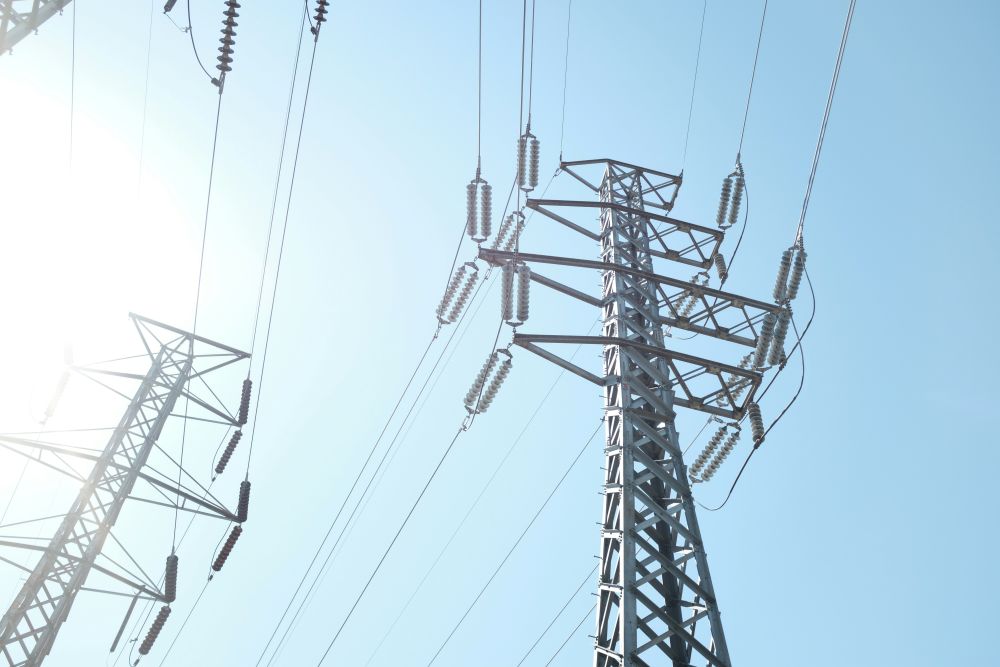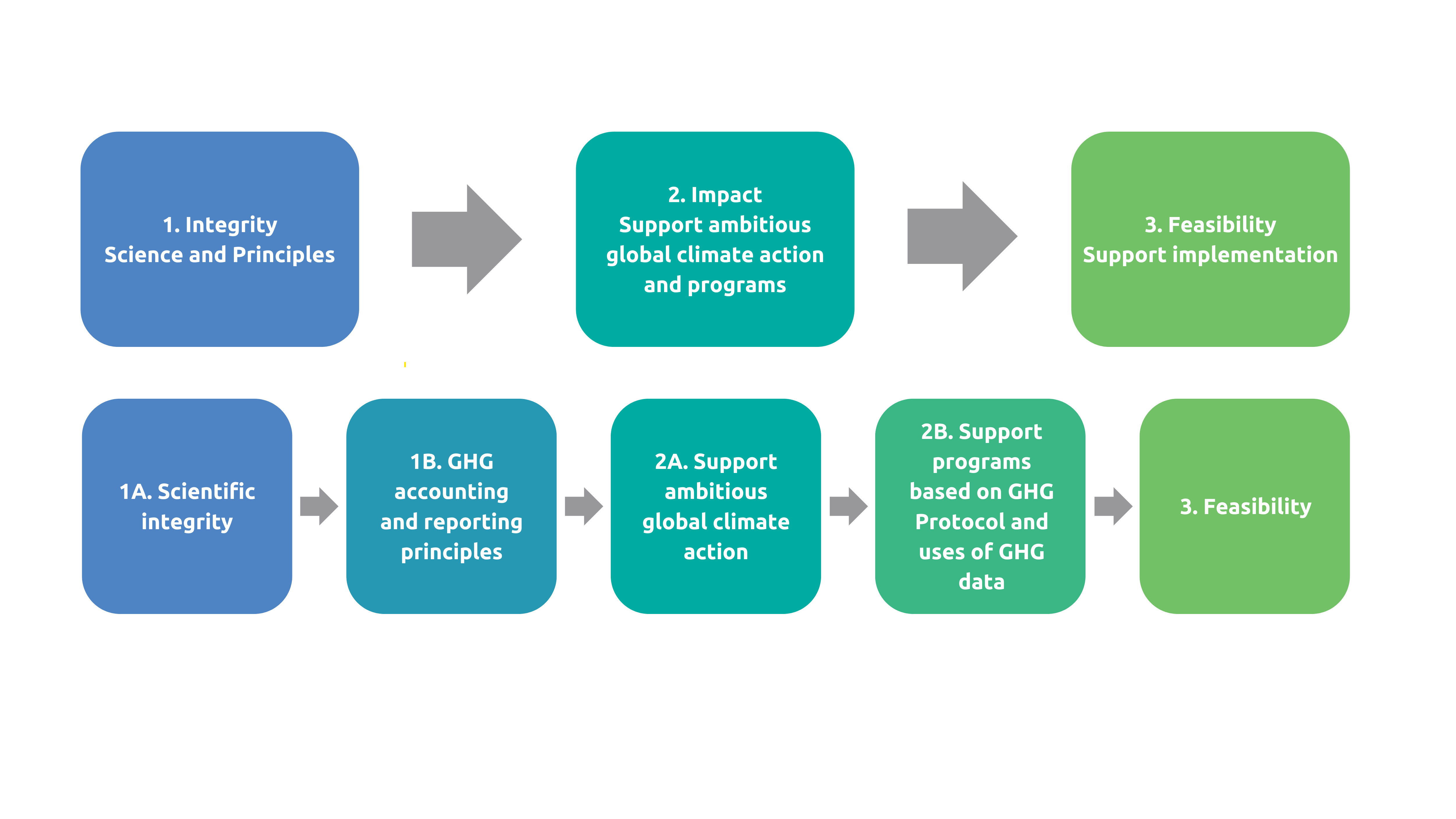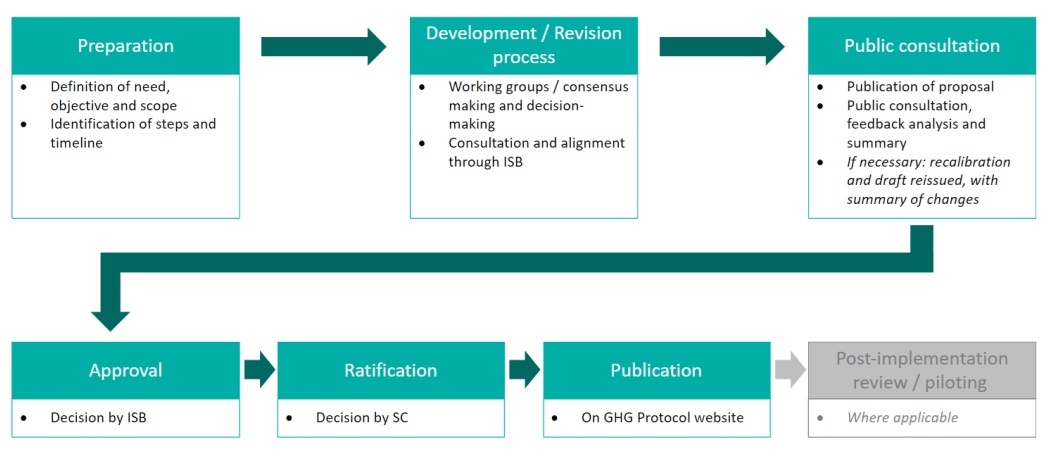
Title
I. Overview of Public Consultation Process
III. Background on the Consultation
IV. Additional Considerations When Submitting Feedback
V. Importance of Public Consultation
I. Overview of Public Consultation Process
Public consultation is a critical component of GHG Protocol’s Standard Development and Revision Procedure, providing an opportunity for all stakeholders to contribute feedback on key topics related to GHG Protocol standards and guidance.
| UPDATE: Two public consultations were originally slated for 60-day period between October 20 and December 19. The consultation period for both proposed updates has been extended to January 31, 2026 in response to stakeholder feedback. |
All relevant materials for both public consultations are available on this landing page:
- Scope 2 Public Consultation
- Electricity-Sector Consequential Methods Public Consultation
The first focuses on proposed updates to the Scope 2 Guidance (2015), to keep scope 2 corporate inventory accounting fit for purpose. The second seeks feedback on consequential accounting methods for estimating avoided emissions from electricity-sector actions, which will inform ongoing work of the Actions and Market Instruments (AMI) Technical Working Group. For more information about the difference between inventory and consequential accounting (also known as project accounting) please see our explainer here: Inventory and Project Accounting: A Comparative Review | GHG Protocol
II. How to Submit Feedback
There are four steps in the consultation process depicted in the graphic below:

Steps 1 + 2 (External stakeholders)
To contribute your feedback, please first review the public consultations landing page. The landing page includes a PDF overview as well as a corresponding online survey for each of the two public consultations. Please submit all feedback via the relevant online survey form. Feedback shared with GHG Protocol via other channels will not be considered as part of the public consultation process.
Steps 3 + 4 (GHG Protocol)
For the Scope 2 Public Consultation, GHG Protocol will analyze the feedback, and, in consultation with the Scope 2 Technical Working Group, will work to review and revise the proposals for inclusion in the draft Scope 2 Standard. Revised proposals will be discussed with the ISB on an as-needed basis. A second public consultation on scope 2 topics will follow in 2026, with final publication of the new scope 2 standard slated for 2027.
For the Electricity-Sector Consequential Methods Public Consultation, stakeholder input will be synthesized and used to inform the Actions and Market Instrument (AMI) Technical Working Group which will develop requirements for reporting emissions impacts outside corporate inventories.
Following the consultation period, GHG Protocol will prepare a public summary of all comments, highlighting key themes and proposed areas for amendment. In line with the Standard Development and Revision Procedure, GHG Protocol also will analyze the number and variety of stakeholders that have submitted feedback to determine whether these are representative of all key groups. If GHG Protocol determines that insufficient input has been received from any key stakeholder group(s), GHG Protocol will proactively seek feedback from the underrepresented stakeholder groups.
Please note that the public consultation period is not a voting exercise. Following conclusion of the public consultation period, all feedback submitted via the public consultation process will be evaluated in line with the Standard Development and Revision Procedure and weighed against GHG Protocol’s decision-making criteria and hierarchy detailed in Annex A of GHG Protocol’s Governance Overview. The number of times a particular comment is submitted does not necessarily impact what will end up in the final draft of the new Scope 2 Standard nor how the input will be considered in the AMI TWG going forward.
Prior to publication, all standards are approved by the Independent Standards Board and ratified by the Steering Committee, to ensure due process has been followed.
III. Background on the Consultation
As the first step in updating the suite of corporate standards, GHG Protocol held an initial public consultation between November 2022 and March 2023 with four surveys covering the Corporate Standard (2004), the Scope 2 Guidance (2015), the Scope 3 Standard (2011) and Scope 3 Calculation Guidance (2013), and actions and market instruments (a new workstream).
Scope 2
GHG Protocol received over 400 submissions to the survey on the Scope 2 Guidance (2015), which are summarized in this overview. This feedback was a key input in the development of the Scope 2 Standard Development Plan and provided the foundation for the Scope 2 Technical Working Group, which was convened to support the update.
The Scope 2 Standard Development Plan outlines the objectives, scope of work, standard development process, and work plan for revising the existing GHG Protocol Scope 2 Guidance (2015) to produce a Scope 2 Standard and supporting guidance.
Electricity-Sector Consequential Methods
The Electricity-Sector Consequential Methods Public Consultation is being held per the decision of the Independent Standards Board as detailed in this recent blog: Scope 2 Standard Advances: ISB Approves Consultation on Market- and Location-Based Revisions; Signals Cross-Sectoral Work Ahead on Avoided Emissions | GHG Protocol
IV. Additional Considerations When Submitting Feedback
Role of Decision-Making Criteria and Hierarchy
All revisions are weighed against GHG Protocol’s decision-making criteria and hierarchy, detailed below. GHG Protocol encourages stakeholders to review the criteria and hierarchy in advance of submitting feedback.
For the proposed updates to the Scope 2 standard: The accounting and reporting principles referenced in 1B are accuracy, completeness, consistency, relevance, and transparency, which are defined on page 8 of the Governance Overview.

Requirement Language
Stakeholders are also encouraged to familiarize themselves with the convention of “shall,” “should,” and “may” language used within standard setting. In the proposed revisions:
- “Shall” denotes a requirement, and is synonymous with “must.”
- “Should” denotes a recommendation, meaning that the provision is not required, but is encouraged.
- “May” means a provision is possible, but is neutral – it is neither recommended nor not recommended.
As GHG Protocol is a voluntary standard, when GHG Protocol includes requirements these apply only if a company chooses to use GHG Protocol standards and guidance for their GHG emissions accounting and reporting. Some jurisdictions may require companies to disclosure their emissions via mandatory disclosure initiatives, but GHG Protocol itself does not mandate emissions accounting and reporting. Only companies who choose to use GHG Protocol standards, or those who are required to by legislation, are subject to the requirements that GHG Protocol sets out.
V. Importance of Public Consultation
The public consultation process is a critical element in the development of credible, high-integrity and applicable standards. GHG Protocol encourages all stakeholders to submit their feedback and greatly appreciates participation in this process.
Addendum: Background on the GHG Protocol Standard Development and Revision Procedure
The development or revision of GHG Protocol Standards is governed by the Standard Development and Revision Procedure. In general, this includes the following steps:

If you'd like to receive e-mail updates from GHG Protocol, including updates regarding the upcoming public consultations, please subscribe to our distribution list via this form.